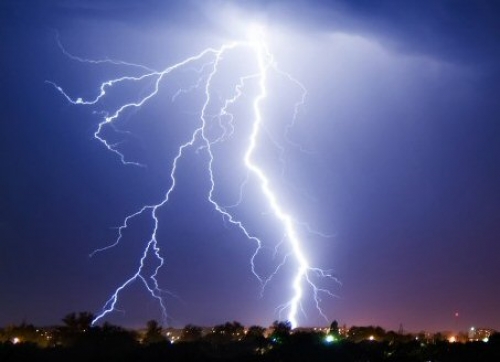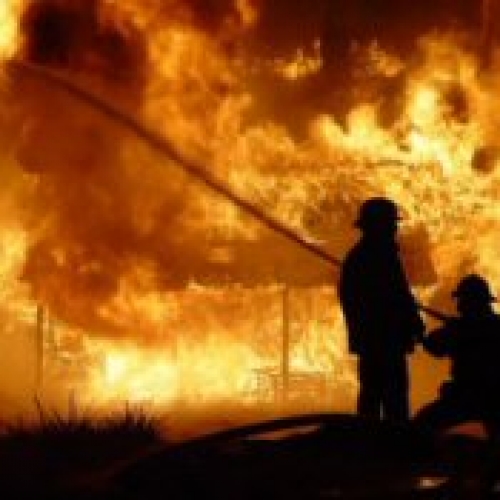 William M. Sparks 1945 - 2023
William M. Sparks 1945 - 2023
My father, William (Bill) Sparks, passed away sadly but comfortably Sunday morning, surrounded by his family. He was a kind and loving man with a heart of gold. There are so many who loved him and will feel this loss – in the business world and far beyond. He would say thank you to all of his small-business customer for their support, and he would wish everyone peace and happiness. I have run the William M. Sparks Insurance Agency for many years now, and I will continue to run it just as my father did and as he would want me to do. On behalf of my family, I thank you all for your kind words, well wishes and support at this time. --- Danielle Sparks
When we think of summer weather phenomena, hurricanes are often top of mind. But in fact lightning occurs more frequently, affects more areas, and packs a huge – although different – punch. Lightning strikes without warning and, in an instant, can cause devastating structure fires, deaths and hundreds of millions in damage expenses – not to mention the threat to your personal safety. How much do you know about lightning? For example, would you know what time of day and month of the year most lightning occurs? It is worthwhile to know as much about this threat as you can so you are able to protect yourself and your family as well as your property.
ErieSense.com says: “From 2007 to 2011, local U.S. fire departments responded to an average of 22,600 fires per year that were started by lightning. These fires caused an average of nine civilian deaths and $451 million in direct property damage per year. Home fires accounted for 19 percent of the lightning fires.”
Homeowners Insurance TipWould your Homeowners Insurance policy cover you for home fire and other property damage as well as personal injury that lightning could cause? If you can’t say yes without hesitation, perhaps it’s wise to contact your insurance agent for a review of your insurance policy to confirm that your Homeowners Insurance coverage is sufficient to protect your investment and cover your liability. Do it today – we never know when lightning will strike. |
The William M. Sparks Insurance Agency in Lutherville - Timonium MD is a full service agency offering homeowners insurance, auto/car insurance, business/commercial insurance and life insurance to all of Maryland, Virginia and Pennsylvania since 1981. Our experienced insurance agents welcome your inquiries and are glad to discuss your coverage needs at any time.
This year, Take Your Kids to Work Day falls on April 24th. As an employer or business owners, you will need to know about the liability, compliance and insurance issues in advance. Using this opportunity to share your workplace with your child can add new dimension to your relationship and offer your child the chance to begin thinking about their own work future. No matter what your role is in your company, it might be worthwhile to know how this special day began and how it has evolved.
From ErieSense.com: “It’s also a good idea to leave younger kids at home or at school. Though it depends on your child’s maturity level, age 12 is usually a good age to first bring a child into the workplace… make sure to check in with your child’s school well ahead of time regarding your plans.”
Read the entire article for a few Take Your Kids to Work Day Guidelines to make the day worthwhile.
Business/Commercial Insurance TipChildren who visit on Take Your Kids to Work Day are viewed as any other guest in your workplace, and any issue or accident would typically be covered under a business owner’s general liability insurance coverage. In most cases, there would likely not be the need for any further additional coverages. However, you will want to consult with your insurance agent well in advance to confirm that the proper coverage is in place for your business. |
The William M. Sparks Insurance Agency in Lutherville - Timonium MD is a full service agency offering homeowners insurance, auto/car insurance, business/commercial insurance and life insurance to all of Maryland, Virginia and Pennsylvania since 1981. Our experienced insurance agents welcome your inquiries and are glad to discuss your coverage needs at any time.
Happy Valentine’s Day! February is "Insure Your Love" month. Find out how you can leave a legacy of love for your family.
You’ll want to view this short video from the Life Foundation. We think you’ll find it compelling. It will make you think about how your choices affect the lives of your loved ones and how their futures depend upon your decisions and actions.
We challenge you to watch this video and then answer honestly: Would you be the "before" or the "after"? Be sure to watch all the way through to see the creative twist.
Since we can’t predict what is in our future, taking the necessary steps to protect your family’s financial future will give you and them priceless peace of mind. You will know that your loved ones will be able to go on with their lives and pursue their dreams even if they must go on without you.
Here at the Sparks Insurance Agency we know Life Insurance. We’d welcome the opportunity to help you in exploring the many policy options available. Why not give us a call at your convenience?
Dave and Janet Miller’s home near Denver. Colorado was destroyed by fire. Following that ordeal, they have been motivated to share the lessons they learned during the experience. In their video, you’ll see how an everyday 9-volt battery was actually responsible for this fire. The devastation which began in the garage quickly spread to the inside of the home, and dangerous thick black smoke penetrated throughout. It left extensive damage in every room. Dave was able to escape along with his pets, but it was a close call.
This family is sharing this story to alert you to the potential for something as seemingly harmless as a 9-volt battery to cause a raging fire and put a family out of their home.
Watch the video (6:26) for all the details.
{youtube}OSJH21WmALc{/youtube}
Video Note: You will hear loud beeps that might seem that your own smoke detectors are sounding. However, rest assured that it is sound from the video. Because the power had been turned off, the remaining smoke detectors in the Miller’s house were beeping periodically.
Homeowners Insurance Tip
You might be wondering whether your homeowners insurance would cover the replacement of your home and all your belongings in the event that your home were to be destroyed by fire. Unsure of your coverage? Then we encourage you to meet with your insurance agent for a homeowners insurance policy review so that you know what protection you now have. If needed, your agent can help you explore your options if you need to make changes.
Here at the Sparks Insurance Agency, our agents help residents of Maryland, Virginia and Pennsylvania, each day to understand their insurance coverage. We would welcome the chance to do the same for you. Why not contact our office at your convenience?
 You might have thought that the worst thing that could happen on a festive holiday like Thanksgiving would be that you would overeat. However, cooking that feast that the family will enjoy could present serious risks as well. In fact, the National Fire Protection Association (NFPA) warns that Thanksgiving Day is the most dangerous day of the year for home cooking fires, with 2-3 times as many house fires occurring on Thanksgiving compared to any other day of the year.
You might have thought that the worst thing that could happen on a festive holiday like Thanksgiving would be that you would overeat. However, cooking that feast that the family will enjoy could present serious risks as well. In fact, the National Fire Protection Association (NFPA) warns that Thanksgiving Day is the most dangerous day of the year for home cooking fires, with 2-3 times as many house fires occurring on Thanksgiving compared to any other day of the year.
Deep Frying the Turkey Could Ruin Your Day
Perhaps the newest Thanksgiving trend is preparing the turkey in a deep fryer to get a delicious, tender, juicy and golden brown result that draws those “oohs” and “ahs” around the dinner table. If done with extreme caution, this cooking method can also greatly shorten the cooking time. However, far too many “cooks” take dangerous shortcuts, ignore the safety warnings and find themselves with serious property damage, injury and even death from the home fires that occur.
The U.S. Consumer Product Safety Commission (CPSC) says that most turkey frying accidents occur while the oil is being heated, prior to even adding the turkey. This means we must be extra vigilant when heating the oil, and turn off the fryer immediately if any smoke appears. If the oil overheats, it can ignite.
This video shows what can happen when turkey deep-frying goes bad.
Planning to Try Turkey Deep Frying This Year?
If you’ll be deep-frying that Thanksgiving turkey this year, then be sure to do your homework in advance. To help you, we’ve included a Recipe for Deep-Fried Turkey to help with the preparation along with a video with step by step instructionsl
We’re also passing along a Cheat Sheet for you including the best Safety Tips from our good friend, Libby Green and Service Masters of Bel Air to help you stay safe.
Homeowners Insurance Tip
No one ever thinks they will suffer a home fire causing devastating property damage, injury or death to their loved ones – especially at a time when family gathers to celebrate Thanksgiving. But, you need to be prepared, nonetheless. So if you have not reviewed your homeowners insurance policy recently, why not do it now. Just contact your insurance agent to be sure of your coverage.
Here at the William M. Sparks Insurance Agency, our experienced agents welcome your questions and would be glad to sit down with you to do an insurance policy review and let you know if you still have the best coverage at the best rates available to meet your needs.
Tag Cloud

|
|
 |








